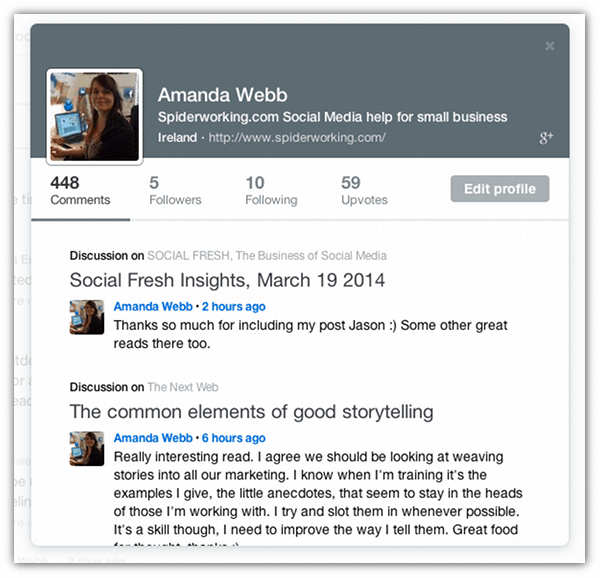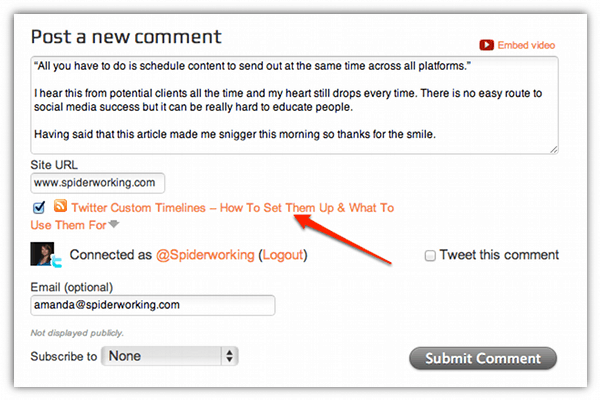
It can be hard to get blog comments but it’s always nice to get them. It proves that people are reading your posts and are interested in what you write.
It can be easy to obsess about the lack of comments on our blogs but in truth there is far more to be gained by incorporating commenting on other blogs into your social media plan.
Why write blog comments?
You will get more comments – If you comment on blogs some people will follow the link back to your blog and return the favour.
You will become a stronger part of the blogging community – You will get to know other bloggers and build strong relationships with those who can share your content.
You will find inspiration – When you get involved in comment threads you will be inspired by the experiences of others and you will learn. This gives you new insights and new topics for blog posts.
Establishes expertise – As well as learning from others you have the opportunity to add your own perspective to a post. You can showcase your expertise and thought leadership.
Why don’t people leave comments on blogs?
Leaving comments isn’t always that easy to do. Having to sign in and remember passwords for the various websites and blog commenting systems can be enough to put people off.
Bloggers may see the benefit of commenting but members of the public are more likely to pick up a phone or fire off an email than sign into a site. You may find that some will prefer to comment on the social sites you share your blog posts to rather than the post itself.
If you want more comments you need to make it easier for everyone to post on your site.
Tip – Consider adding a ‘How to comment’ link just above your commenting section so users can easily see how to do it.
How to write good blog comments
Set aside time – Good commenting takes time so it’s important to make time for it. You need to allow enough time to read posts and compose a decent response.
Set yourself a goal – Decide how many quality comments you can write in your allocated time. For example 10 minutes a day is enough time for one decent comment a day. Set this as your goal.
Read the post – When someone hasn’t read a post before commenting it stands out like a sore thumb. A post may well start making one assumption and end on another. Don’t assume you know what the post is. Read it and comment accordingly. It may seem obvious but you’d be surprised how often people comment without reading.
Read the other comments – Read what others have written, you might find that your point has already been. Don’t let this discourage you, use it as an opportunity to contribute to that thread. You could learn something from the discussion.
Contribute – Comments like ‘great post’ or ‘thanks for this’ is nice to get but they don’t contributing to the conversation. You won’t meet your goals unless you spend some time crafting your responses. Before you post ask yourself if your response is adding anything to the conversation. If the answer is no then don’t hit send.
How to add value
- Quote a section from the blog and saying why you help it useful
- Ask a question that occurs to you whilst reading the post
- Share your personal experience or opinion about the blog post topic
- Get involved in a conversation in an existing comment thread
Tip – Leave your comment open for discussion – End your comment with a question and you are inviting others to join in the thread.
Commenting systems
There are lots of commenting systems available for blogs. Some allow you to simply leave a comment, others need you to sign in with a social network or open an account.
Signing in with a social media account
Many blogs allow you to sign in with your social media profiles to leave a comment. If you do this think about which account you would like to showcase. For example, I don’t want to attract more friends to my Facebook personal account. I would like to connect with more like minded people on Twitter or Google+. For this reason I should use Twitter and Google+ to handle my social logins for blog commenting.
Disqus
I use the Disqus commenting system on this blog. Here’s why:
- It allows me to showcase my profile wherever I comment
- I can follow other commenters
- I can follow comment threads on other blogs
- I can showcase recent comments at the bottom of my blog posts
- I find a lot of other social media bloggers use it so it’s a good way for me to connect with them
When you click on the name of a Disqus user you get a little snapshot of them including a link to their site, social media profiles and a list of their latest comments. You can also choose to follow them from here.

The downside
Although you can choose to comment as a guest some are put off by having to register to comment.
Comment Luv
I’ve used lots of commenting systems when commenting on other blogs but one that stands out is Comment Luv.
Here’s some benefits:
- You can choose to login with your social channels
- You can post as a guest
- When you add your blog address to a comment it will display a link to your latest post in the comment box
This last point is huge. It means that those who like what you say can follow the link straight back to your latest post.


Conclusion
There are lots of advantages to commenting, if you are serious about blogging it is something you should be doing on a regular basis. I have been making an effort to do it more regularly myself and am enjoying the process.
It’s equally important that you are making it easy for non bloggers to comment on your blog. If it’s too hard to sign in they won’t do it. Make sure that readers are able to find your social channels, your phone number and your email address too.
Do you comment on blogs? Is it on your agenda? Maybe this is where you can start. Leave me a comment below.







